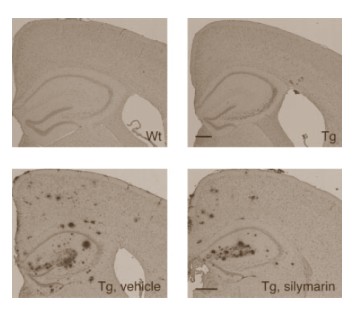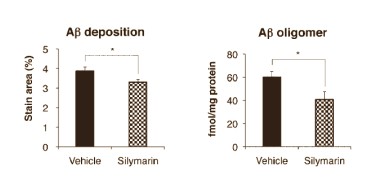Milk Thistle and liver protection
Milk Thistle
 Most bodybuilders use Milk Thistle (Silybum marianum) to protect their liver when they are using oral steroids. But this herbal medicine has much more benificial properties.
Most bodybuilders use Milk Thistle (Silybum marianum) to protect their liver when they are using oral steroids. But this herbal medicine has much more benificial properties.
The brains of a mouse type that develops Alzheimer's at a young age keep functioning well for longer if the animals are given extracts of milk thistle [Silybum marianum] mixed with their food, researchers at the Tokyo Metropolitan Institute of Gerontology discovered.
Supplementation with Silybum marianum – the plant is also known as milk thistle – induces liver cells to synthesise more glutathione, a detoxifier which improves the functioning of the liver. Animal studies have shown that Silybum marianum protects the liver against the effects of oral anabolic steroids. [Med Pregl. 2003;56 Suppl 1:79-83.]
It is also possible that the plant has a similar protective effect on the prostate. [Integr Cancer Ther. 2007 Jun; 6(2): 130-45.] Prostate cancer may occur as a result of the decrease in production of detoxifying enzymes that occurs with aging. [Exp Gerontol. 2012 Mar; 47(3): 223-8.] There are also indications that Silybum marianum blocks the growth-enhancing effects of androgens on prostate cancer cells. [Carcinogenesis. 2001 Sep;22(9):1399-403.]
The Japanese researchers wanted to know whether milk thistle had similar positive effects in the brain. Silybum marianum reduces the accumulation of fats and cholesterol in the body, was their reasoning. And this accumulation resembles, to some extent, the accumulation of beta-amyloid plaques in the brains of Alzheimer's sufferers. These plaques interfere with the brain's functioning. So, might Silybum marianum inhibit the formation of these plaques?
To answer this question the Japanese did an experiment with mice that had been genetically modified so that they synthesised plaques [Tg]. Alzheimer's researchers often use this kind of mice for their studies. The researchers gave half of their lab animals food consisting of 0.1 percent Silybum marianum for six months. At the end of this period they subjected the mice to psychological tests and studied their brains.
 In one trial the researchers put the mice in a cage with three runs. The Japanese then recorded how often the mice entered the runs. Animals with Alzheimer's are less calm than healthy animals. In this kind of situation they keep on checking out their surroundings – probably because their brains do not retain a memory of earlier forays around the cage.
In one trial the researchers put the mice in a cage with three runs. The Japanese then recorded how often the mice entered the runs. Animals with Alzheimer's are less calm than healthy animals. In this kind of situation they keep on checking out their surroundings – probably because their brains do not retain a memory of earlier forays around the cage.
The figure on the right shows that months of supplementation with Silybum marianum had no effect on the behaviour of normal mice [Wt], but did reduce the number of times that the Alzheimer's mice checked out their surroundings.
The photos below show samples of brain tissue. The upper row shows tissue from mice at the start of supplementation. The bottom row shows brain tissue from Alzheimer's mice aged one year. The dots are plaques.

The figures below are self-evident. Supplementation with Silybum marianum reduced the formation of the blocks of which beta-amyloid plaques are composed, and inhibited the process through which the building blocks form plaques.

The Japanese converted the Silybum marianum dose they used to a dose for humans, and arrived at 16 mg/kg/day. That is twice the amount of the dose that researchers in Iran tried out in a 4-month trial on people with diabetes type-2, where they encountered no problems. [Phytother Res. 2006 Dec;20(12):1036-9.]

Source:
Biosci Biotechnol Biochem. 2010;74(11):2299-306
Accourding to the Mayo Clinic these is the present situation of Milk Thistle.
There are many studies done, mostly with a modest number of participants to little to be scientific relevant.
Liver disease (chronic)
Several studies of oral milk thistle for hepatitis caused by viruses or alcohol report improvements in liver tests. However, most studies have been small and poorly designed. More research is needed before a strong recommendation can be made.
Cirrhosis
Multiple studies from Europe suggest benefits of oral milk thistle for cirrhosis. In experiments up to five years long, milk thistle has improved liver function and decreased the number of deaths that occur in cirrhotic patients. Although these results are promising, most studies have been poorly designed. Better research is necessary before a strong recommendation can be made.
Acute viral hepatitis
Research on milk thistle for acute viral hepatitis has not provided clear results, and milk thistle cannot be recommended for this potentially life-threatening condition
Amanita phalloides (mushroom poisoning)
Milk thistle has been used traditionally to treat Amanita phalloides mushroom poisoning. However, there are not enough reliable studies in humans to support this use of milk thistle.
Cancer
There are early reports from laboratory experiments that the chemicals silymarin and silibinin in milk thistle reduce the growth of human breast, cervical, and prostate cancer cells. There is also one report of a patient with liver cancer who improved following treatment with milk thistle. Early laboratory studies also suggest that silymarin and other active substances in milk thistle may have anticancer effects. These substances appear to stop cancer cells from dividing and reproducing, shorten their lifespan, and reduce blood supply to tumors. Some studies suggest silymarin may favorably supplement sunscreen protection and may help reduce the risk of skin cancer. More studies are needed, however, to show whether milk thistle has any effects in the body (not just in test tubes).
Diabetes (in patients with cirrhosis)
A small number of studies suggest possible improvements of blood sugar control in cirrhotic patients with diabetes. However, there is not enough scientific evidence to recommend milk thistle for this use.
Dyspepsia (indigestion)
An herbal preparation containing milk thistle may be effective in decreasing symptoms of functional dyspepsia. However, milk thistle alone has not been researched.
High cholesterol
Although animal and laboratory research suggests cholesterol-lowering effects of milk thistle, human studies have provided unclear results. Further studies are necessary before a firm recommendation can be made.
Liver damage from drugs or toxins
Several studies suggest possible benefits of milk thistle to treat or prevent liver damage caused by drugs or toxic chemicals. Results of this research are not clear, and most studies have been poorly designed. Therefore, there is not enough scientific evidence to recommend milk thistle for this use.
Menopausal symptoms
An herbal preparation containing milk thistle may be effective in decreasing menopausal symptoms. However, milk thistle alone has not been researched.
- Login to post comments


